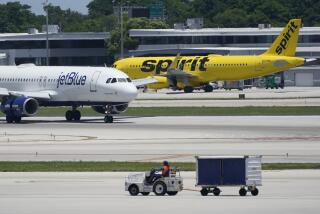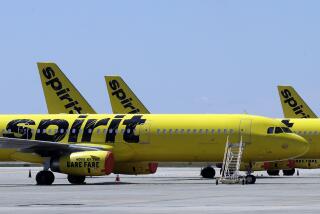Western Cites ‘Compelling’ Merger Reasons
- Share via
Western Airlines executives wanted to keep the nation’s oldest scheduled air carrier independent, but a call from Atlanta just before the Labor Day weekend changed all that.
Western Chairman and Chief Executive Gerald Grinstein got the call, flew to Delta’s headquarters in Atlanta and spent his holiday negotiating the $860-million merger, approved Tuesday, that will create the nation’s fourth-largest airline.
“We would have, for many reasons, preferred to have continued alone, but there were some very compelling reasons when Delta came up,” the 54-year-old Grinstein said in an interview.
“This is a model of what mergers ought to be. It’s a strengthening of what both companies should be competitively.”
‘Very Unanticipated’
Despite persistent rumors that Delta Air Lines had been casing Western Airlines with an eye toward a merger, “it was very unanticipated,” Grinstein said of Delta’s $12.50-per-share offer.
As for Grinstein himself, the former Seattle lawyer confessed that he is still “a little numb” from the whirlwind negotiations and doesn’t know what his future will be.
Western, a largely regional carrier that focuses on the West, had been a prime takeover candidate in the merger-happy airline industry. It posted a record $67.1-million profit last year after running up nearly $300 million in losses in the previous five years.
It became interested in the Delta merger because Western lacked a “critical mass” of national routes, Grinstein said, that would allow the company to carry more passengers the full length of their trips and save money through more efficient use of airplanes.
“The process of the investment to build that up would have taken a lot out of our balance sheet,” Grinstein said. What’s more, “our employees have made several sacrifices” to return Western to profitability, and they would have faced an “uncertain future” if Western had risked the money to build a larger route system.
Finally, “Our shareholders are able to get $860 million for something that was worth $62 million a couple of years ago,” he said.
The sudden merger negotiations were kept so quiet that most company directors had no clue about the proposal that faced them when they gathered Tuesday in New York.
The vote to approve the merger was not unanimous, said Jim Shields, one of four union representatives put on the board in exchange for wage concessions. He declined to reveal who opposed the plan.
Shields, president of the Air Transport Employees Union, Western’s largest union, said he did not back the merger because he believes that Delta, which is primarily non-unionized, will not honor Western’s labor contracts after the air carrier is absorbed into Delta. Western will be operated as a subsidiary of Delta for up to a year before the operations of the two airlines are consolidated.
Although Delta has not said that Western’s labor contracts will be void after the merger, Shields said that is his impression from the daylong board meeting and a letter to Grinstein from Delta Chairman David C. Garrett Jr. He said the letter discusses “phasing” Western employees into Delta’s benefits plans, among other things, after the merger.
“It’s readily apparent to me right now that Delta is not going to honor the labor agreements,” said Shields, who is trying to arrange a meeting with Delta officials. “It appears that there are going to be some rather serious labor problems arising from this merger.”
Officials at Delta, whose employees are among the best paid in the airline business, and Western, whose workers are paid below the industry average, foresee no labor problems.
Delta spokesman Bill Jackson said that in two previous takeovers of unionized airlines, the contracts lapsed and employees were allowed to vote on whether they wanted to be represented by a union.
While Western is a Delta subsidiary, Western’s full-time employees will be offered jobs and “pay scales following the merger will not be less than those offered by Western,” Jackson said. No plans have been set for after Western’s operations are consolidated into Delta, he said.
Shields said he also opposed the merger for an emotional reason: After four years of “tremendous economic sacrifices” by Western’s workers to pull the company from the brink of bankruptcy, “it’s a sad day to see Western in a position where Western just disappears from the face of the earth.”
More to Read
Inside the business of entertainment
The Wide Shot brings you news, analysis and insights on everything from streaming wars to production — and what it all means for the future.
You may occasionally receive promotional content from the Los Angeles Times.










